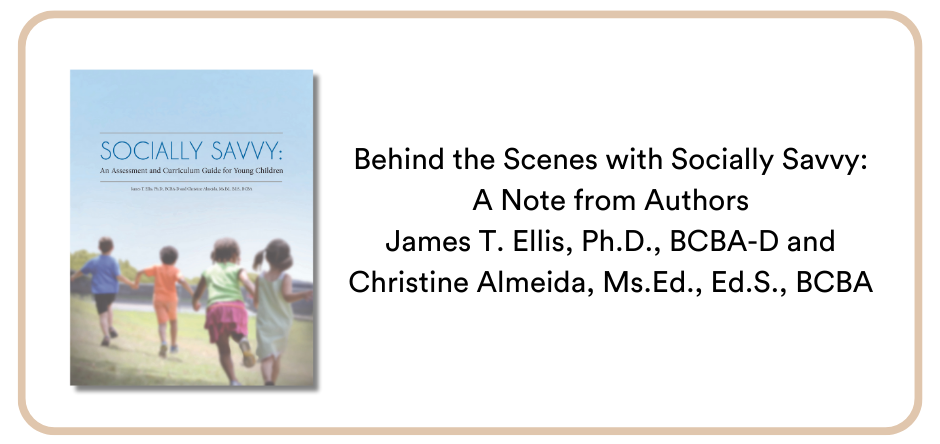
by James T. Ellis, Ph.D., BCBA-D and Christine Almeida, Ms.Ed., Ed.S., BCBA
Since first publishing Socially Savvy, there has been so much progress in the way that we approach, assess, and support students with learning differences. Because we are not only the writers of Socially Savvy, but also users of it, we have also learned so much over the past decade as we have used the assessment and intervention strategies with the children that we have supported. Our belief that there is not a “one size fits all” approach has strengthened. The social skills that we identified in Socially Savvy as important for young children are skills that might be important for some children in some settings, may not be important for other children, and there may be other skills that we have not identified that might be important for other children. We continue to want to make sure that Socially Savvy is used as a guide to help therapists, educators, and parents determine what skills are important to target for the children who they are supporting.
Being a good educator requires us to grow and learn along with the children that we teach. That is why we have released the Socially Savvy Assessment Protocol with Extended Objectives. In addition to adding a second objective for each skill, we have also freshened up some of the initial objectives. A greater understanding of neurodiversity has developed over the past decade, and we want to make sure that we are carefully considering that when we are making decisions about what social behaviors to target for change, which behaviors to accommodate through environmental changes, and which behaviors to embrace and encourage from children. Part of our reason for updating the objectives is to make sure that we are being conscientious about the diverse ways that children act, think, learn, respond to sensory input, and process the world around them.
Additionally, we have realized that it is helpful to have more objectives for the skills that are part of the Socially Savvy Checklist because children are working on objectives in multiple settings and need to apply the skills in a variety of environments – school, home, community, clinic, etc. What might be an appropriate objective in one setting may not fit the environmental expectations of another setting. We have provided an additional objective for each targeted skill, in the hope that one of the objectives might be a fit for the child with whom you are working, or that the objectives might provide inspiration for developing an objective that matches the needs and environment of the child.
Being a good educator requires us to be creative in how we teach and motivate children to learn. This is especially true when we are teaching social skills, which are complex and often difficult to break down into steps that are achievable for the child and manageable for staff to teach. We want children to learn in a way that is fun, exciting, and continues their growth and curiosity. We also want staff to have fun while they are teaching. By providing an additional objective, we are trying to spark that creativity and help educators make teaching the targeted skills more fun, both for the child and for the teacher. If the objective is clear to staff, appropriate for the setting, and taught in a more fun way, staff are going to work on that skill more. The more targeted social skills can be embedded in simple games and throughout the natural environment, the more fun it should be for staff to run. Consequently, the child is going to have more teaching opportunities embedded in a fun context and is hopefully going to learn more quickly. This then has the added benefit of staff being reinforced by seeing the child learn at a faster rate. If we are having fun, it’s easier for staff to teach and the child to learn!
We also acknowledge and recognize that educators and professionals supporting the social growth of children, whether in a school setting, a family’s home, the community, or a clinic are busy and often overwhelmed. We hope that refining and adding to the objectives will make your work a bit easier. We respect the great work that you all do in helping children grow to their fullest potential. As always, we appreciate hearing from all Socially Savvy users, whether parents, special educators, behavior analysts, or other professionals. Your thoughts and comments have been invaluable. The idea that you find the curriculum useful has been humbling.
About the Authors
James T. Ellis, PhD, BCBA-D earned his PhD in Clinical Psychology from West Virginia University and is a licensed psychologist and board certified behavior analyst. For over 20 years, Dr. Ellis has provided services for children with autism spectrum disorders and their families. In 2008, he helped found the Step by Step School for Children with Autism in Guyana, South America and in 2012, he founded Step by Step Behavioral Solutions, through which he continues to provide consultation and therapeutic support to individuals with autism spectrum disorders and their families.
Christine Almeida, MSEd, EdS, BCBA earned her MSEd in Special Education and EdS in Behavioral Education from Simmons College in Boston, MA. Ms. Almeida is a practicing board certified behavior analyst in the Boston area who has worked in both private and public schools. She currently provides oversight of services for young children with autism spectrum disorders for a public school. Ms. Almeida has presented workshops at the local, regional, and national levels on the subjects of educational assessment, play intervention, and social skills.
